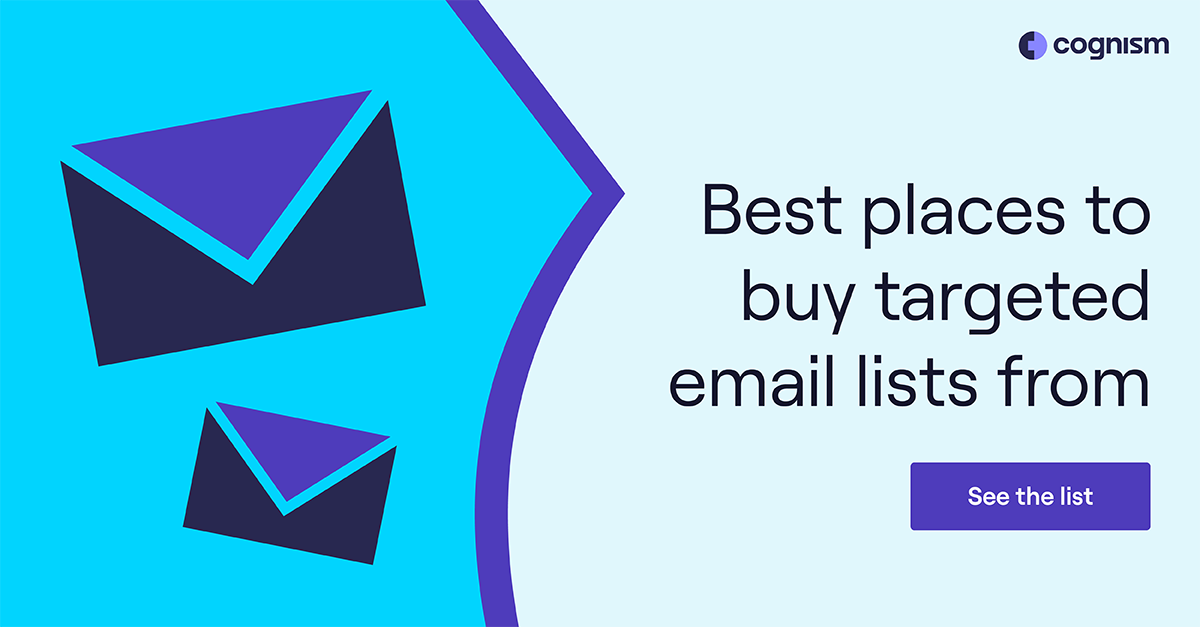Be aware of these points when buying Consider these factors when purchasing a CPA list (Certified Public Accountant). You want to ensure the list is relevant, high-quality and compliant with legal requirements. Consider these factors: The Quality of Data and the Accuracy
Find out where the data came Find out where the data came from. Reputable providers typically gather information from legitimate sources like professional directories, trade organizations, or databases. Avoid lists that are compiled using scraping or other unreliable methods since they may include outdated or incorrect information.
Verification Process: Ensure that the email list is valid and has been updated recently. This helps reduce bounce rates and makes sure you're reaching valid, active emails. Since CPAs frequently change companies or jobs, inquire about how often the list has been changed.
Segmentation/Filters: A CPA List should be able to categorize by geographical location (city, province, country) or by specificization (e.g. accounting auditing, financial planning, or accounting) as well as the years in operation, or the size of the company. Targeted targeting based on these factors will improve the relevance of your campaigns.
2. Legal Regulations
Data Privacy Laws: Ensure that the email list is compliant with data protection laws such as the General Data Protection Regulation (GDPR) and the California Consumer Privacy Act (CCPA), and any other relevant local regulations. Email addresses should be legally obtained with the consent of all individuals involved.
Conformity to CAN SPAM Act: To ensure that U.S. campaigns comply with CAN SPAM Act, which regulates commercial email marketing the list has to be in compliance. It is crucial to offer the option to opt out and avoid making use of misleading subject lines or content. Non-compliance can lead to fines and legal issues.
Opt-in Consent: Verify that email addresses have been obtained through opt-in consent. This means that the users agreed to receive marketing emails from third-party companies. This will increase engagement and reduce spam complaints.
3. Provider Reputation
The reputation of the service should be thoroughly researched. Check out reviews, testimonials as well as case studies to find out what other customers ' opinions are. Established providers will be more likely to supply precise, high-quality information.
Transparency: The provider must be transparent about how data is collected and updated. If the company is unable to explain clearly their process and the reasons behind it, they should be flagged as a red-flag.
Customer Support: A reliable customer support is crucial for those who need assistance in modifying your list, troubleshooting, or understanding the rules of compliance. A competent support team will reduce time and effort throughout the process of launching your campaign.
4. Cost and Return on Investment
Pricing Models. Different companies offer various pricing models. While some charge per-contact some others require the option of a flat or subscription cost. Compare costs to ROI expectations while also balancing the quality and price of the options.
Ask about refund policies. If there is an excessive number of incorrect or inactive email addresses, a majority of service companies offer a replacement or refund policy. A guarantee could give you peace of mind.
Don't just focus on the cost. A list's price may seem appealing, but it may lead to poor engagement or high bounces if its quality is low. Make sure you purchase lists that provide quality through accuracy of data and segmentation options.
5. Use and Ownership of Data
Single-Use and Multiple-Use. Multiple-Use: Make sure you know if you're purchasing the list only for a single use or whether you own the information and are able to use it for ongoing campaigns. Owning a list allows for more flexibility in long-term campaigns even though single-use lists are more expensive.
Shared and exclusive. Exclusive lists: Determine whether the list of email addresses is exclusively yours or shared with other buyers. Shared Lists: Determine if the email list is exclusive to you or shared with other buyers. Shared lists can lead to the audience becoming tired, especially if those who are on it are constantly bombarded with marketing emails.
6. Data Format and Integration
CRM Compatibility - Make sure that the list of contacts is provided to you in a format compatible with your CRM email marketing software, or other programs. This will make it easy to manage of data as well as its transfer.
Ease-of-Use: Evaluate the ease with which data can be segmented and managed, as well as integrated into your system. A well-organized listing can help in making personalization and targeting more effective.
7. Ethical Aspects
Relevance of Content - CPAs have an extremely busy schedule, which is why it's essential to send material that's useful and adds value. Beware of sending messages that are irrelevant and could damage your reputation or lead to more spam complaints.
Avoid sending out excessive emails. Over-communication can lead to unsubscribes or spam complaints that could adversely affect your sender's reputation.
We also have a conclusion.
If you're considering purchasing an CPA mailing list, make sure that you prioritize the data's quality and compliance with the legal requirements, and reputation of your provider. This will ensure that you're making a good investment. An effective segmentation strategy, ethical practice and targeted marketing will increase engagement and return on investment while preserving a positive brand image. Read the recommended cpa email list for more examples.

What Are The Important Things I Should Consider When Purchasing An Nurses Email Database?
You should consider certain factors when buying an email list of nurses to ensure that the list you buy is correct, compliant, and suitable for your outreach or marketing campaign. Here are some important items to keep in your mind:1. Data Quality and Accuracy
Source of Data: Make sure the data is coming from a reliable source like nursing associations or healthcare directories. Avoid lists created using method that is not reliable, such as data scraping, as these might contain outdated or incorrect details.
Checking and updating frequency: Confirm that the service cleanses and updates the data regularly. Inactive, invalid, or duplicate email addresses should be removed from a trustworthy email list. A high-quality information ensures better deliverability.
Segmentation Options. A good nursing email list should offer segmentation options based upon specific criteria like the nursing specialty (e.g. registered nurses, nurse practitioners critical care nurses), locations (states, cities, regions) and employment environments. Segmentation allows you to target your emails more effectively and boosts the engagement.
2. Legal Regulations
Data Privacy Laws: Ensure that the list is compliant with data protection regulations like the General Data Protection Regulation (GDPR) in Europe as well as the California Consumer Privacy Act (CCPA) in the U.S., and other local or regional privacy laws. To avoid fines or harm to your brand reputation It is essential that the email address collection be legal and consented.
CANSPAM Act compliant: If your marketing via email is being conducted in the U.S.A. ensure that the list of recipients is in compliance with the CANSPAM Act. The list should have clearly defined opt-out mechanisms, non misleading subject lines, and complete information on the sender. Violations may result in heavy penalties as well as damage to your business's image.
Consent by Opt-In: The email contact list should include only those who have signed up to receive email communications. The nurses will know that they have signed their explicit consent to be contacted. This reduces the risk of legal issues as well as complaints about spam.
3. Provider Reputation
A trusted vendor: Choose an organization that is known for offering accurate and reliable lists. Check reviews, testimonials, and case studies to assess their credibility as well as the quality of their data.
Transparency: The provider should be transparent about the methods they use to collect and verify the accuracy of their data. If the provider can't be able to clearly define their sources for information and their methods of updating It could mean that they have inaccurate or outdated data.
Customer Support: Opt for a service that offers a robust customer support. A competent support team will help you in resolving any issues including questions regarding compliance or problems with data integration.
4. Costs and Return on Investment (ROI).
Pricing Structure: Learn the pricing model--whether the provider is charged per contact, based on size of the list, or a flat fee. Ensure that the price aligns with your marketing budget and goals.
Ask about the refund or replacement policy of the company you use. Reputable suppliers often offer refunds or replacements for certain percentages of non-deliverable or invalid email addresses, in order to make sure that you receive the exact amount you spend.
Do not focus on the price only instead, consider value: While it is tempting to choose a less expensive list, quality must always be a priority over price. A higher-end, well-segmented and expensive list that is backed by accurate information will yield better engagement and a higher ROI.
5. Data Ownership and Usage
You can make use of the list only once, or you can reuse it. Lists for single-use are typically less expensive, but if you plan to run ongoing campaigns via email using a list, purchasing one you can reuse may offer better price.
Shared vs. Exclusive lists: Find out if the list is only available to you or shared with other buyers. Shared Lists: Decide whether you are the sole buyer on the list, or whether other buyers are able to use the list. Exclusive lists will be more effective, as they will prevent the target audience from becoming overwhelmed. This could result in an increase in engagement.
6. Data Format and Integration
CRM compatibility: Make sure that your list is provided in an CSV or Excel format. This is compatible with every email marketing platform or customer relationship management platform. This will allow for a seamless and efficient integration.
Simple Segmentation: The list must be organized in a way that allows you to easily filter or segment your list based on various criteria. This makes it easier to focus on specific groups of nurses with tailored messages, improving your campaign's effectiveness.
7. Ethical concerns
Relevance of Outreach: Since nurses are professionals who work for long hours, it is essential to communicate relevant information that is both valuable and relevant. Your message should be relevant to their profession, whether it's the latest healthcare products, technological advancements or opportunities for continuing education. Avoid irrelevant or excessively promotional content. It could harm the reputation of your company.
Beware of Spam Methods. Be careful not to overload your audience with too many emails. Sending unnecessary or infrequent emails can lead to a more unsubscribes or spam complaints as well as damage to sender reputation.
Conclusion
When purchasing a nurse's email list, consider data quality as well as legal compliance and the credibility of the company. Be sure that the list has segmentation and is updated regularly. It must also comply with data privacy laws. By investing in an effective targeted and targeted list, and then sending messages targeted and relevant to your audience, you will increase the engagement of your customers and increase the return on your investment. Check out the most popular nurses email list for website advice.
